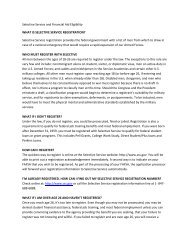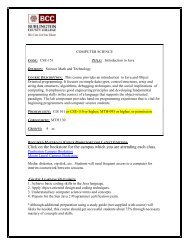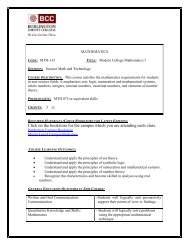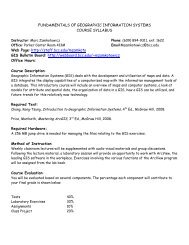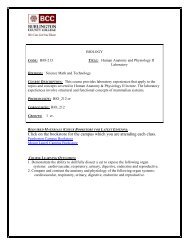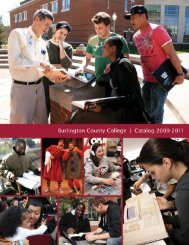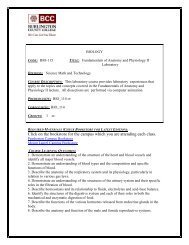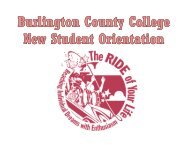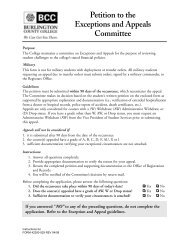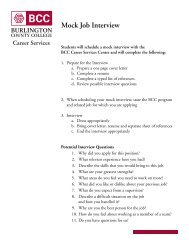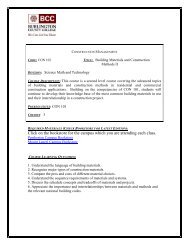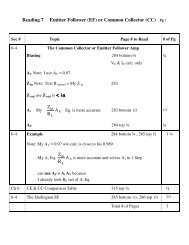Computer Science - Burlington County College
Computer Science - Burlington County College
Computer Science - Burlington County College
You also want an ePaper? Increase the reach of your titles
YUMPU automatically turns print PDFs into web optimized ePapers that Google loves.
History<br />
Option to Liberal Arts, (AA.HIS)<br />
This program is designed to introduce students to the<br />
changes in human society over time, to expose students to<br />
the diversity of the human experience, to chronologically<br />
examine the global struggle of all people, and to assist<br />
students to scientifically evaluate their own heritage.<br />
Written composition, oral presentation, problem solving,<br />
and critical thinking are essential skills used in historical<br />
study. The history curriculum prepares students for study in<br />
a variety of fields including education, public service, and<br />
political science. Moreover, the study of history prepares<br />
students for careers in law, journalism, business, public<br />
relations, international relations, archives, museums and<br />
historical societies. Majoring in history provides an excellent<br />
bridge to any career requiring an in-depth study of the<br />
human condition.<br />
Students planning to teach History on the Elementary or<br />
Secondary level, should include the following as open<br />
Electives; EDU 112 History Foundations and PSY 250<br />
Educational Psychology.<br />
Students planning to transfer after graduation should<br />
consult the catalog of the college where they intend to<br />
complete their studies.<br />
Graduates of this program should be able to:<br />
Demonstrate a factual knowledge of significant<br />
past events;<br />
Demonstrate an understanding of history as a process<br />
of cause and effect, rather than solely as memorization<br />
of facts, dates or people;<br />
Utilize critical thinking to evaluate the impact of<br />
complex human behavior on significant past events;<br />
Demonstrate an understanding of historical<br />
perspective as an instrument to determine what<br />
makes a past event significant;<br />
Use their knowledge of recurring, historical themes<br />
to understand varied outcomes in differing historical<br />
time periods;<br />
Transfer to a four-year institution in a history or<br />
related program.<br />
114 <strong>Burlington</strong> <strong>County</strong> <strong>College</strong><br />
General Education Courses † Credits<br />
Written & Oral Communications 9<br />
Mathematics (MTH 107 recommended) 3<br />
Natural <strong>Science</strong> 7-8<br />
Technology 3<br />
Social <strong>Science</strong> (POL 101 required) 6<br />
Arts & Humanities (ART 250, ART 251 recommended) 9<br />
History (HIS 101 and HIS 103 required)<br />
Diversity (REL 205 or HIS 203<br />
6<br />
or Foreign Language required) 3<br />
Total 46-47<br />
† See General Education Requirements on page 40.<br />
Program Courses Credits<br />
HIS 102 United States History II 3<br />
HIS 104 Modern European History 3<br />
Select three credit hours to include the following:<br />
HIS 266 African-American History I 3<br />
HIS<br />
HIS<br />
267<br />
212<br />
African-American History II<br />
The American Civil War<br />
3<br />
3<br />
& Reconstruction 3<br />
Select three credit hours to include the following:<br />
HIS 204 Modern Latin America 3<br />
HIS 215 Renaissance and Reformation<br />
1300-1700 3<br />
3<br />
HIS 220 Modern Britain 3<br />
Total 12<br />
Elective (LIT 211, POL 250, POL 103,<br />
POL 215 or Foreign Language) 3<br />
Elective ** 3<br />
Total Required for Degree 64–65<br />
**Students planning to teach History on the Elementary<br />
or Secondary level, should include the following as open<br />
Electives; EDU 112 and PSY 250.



